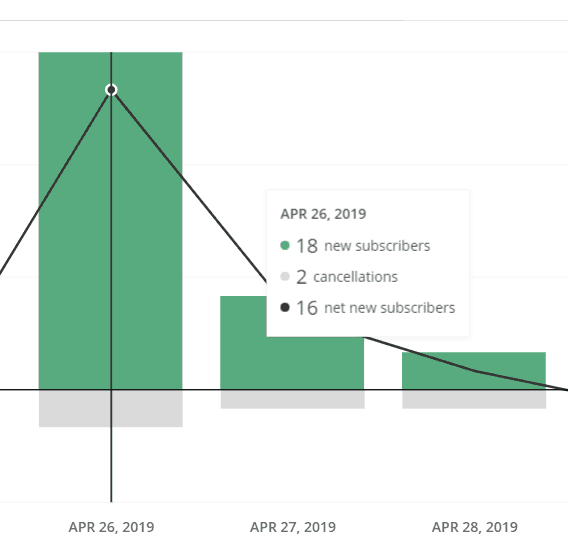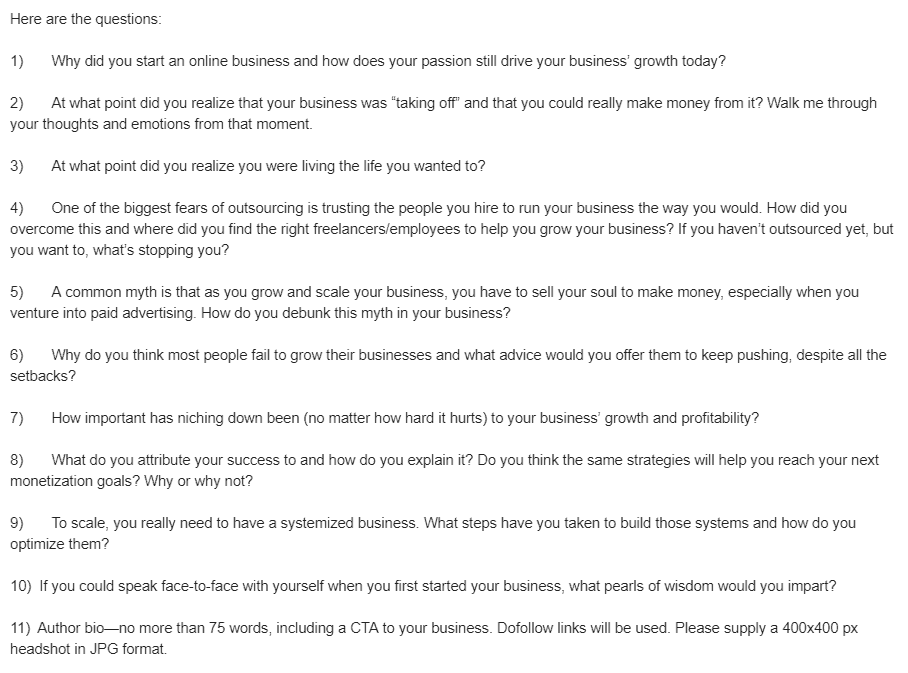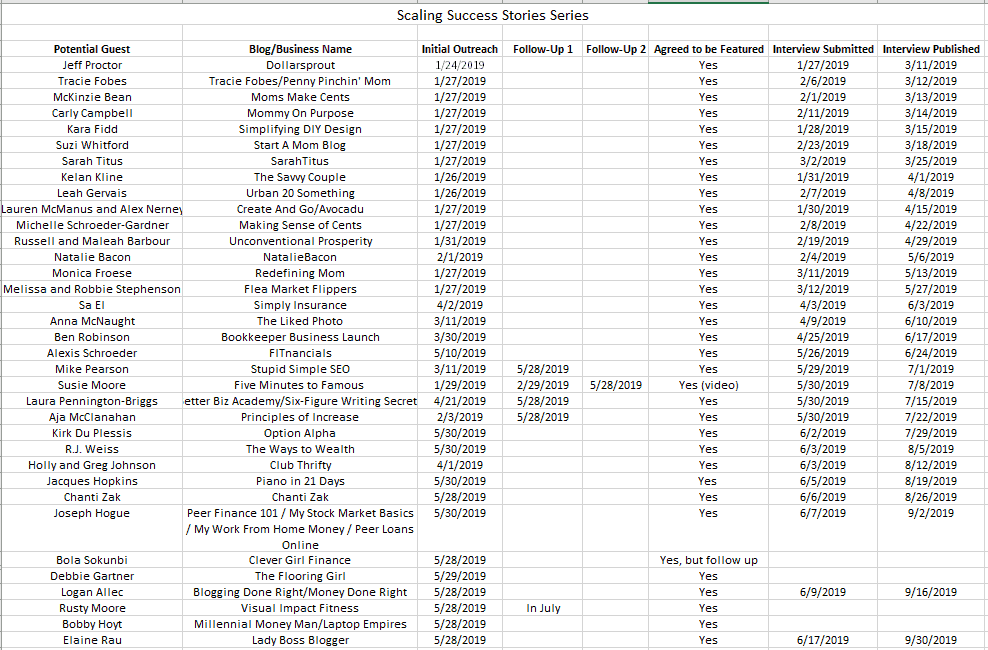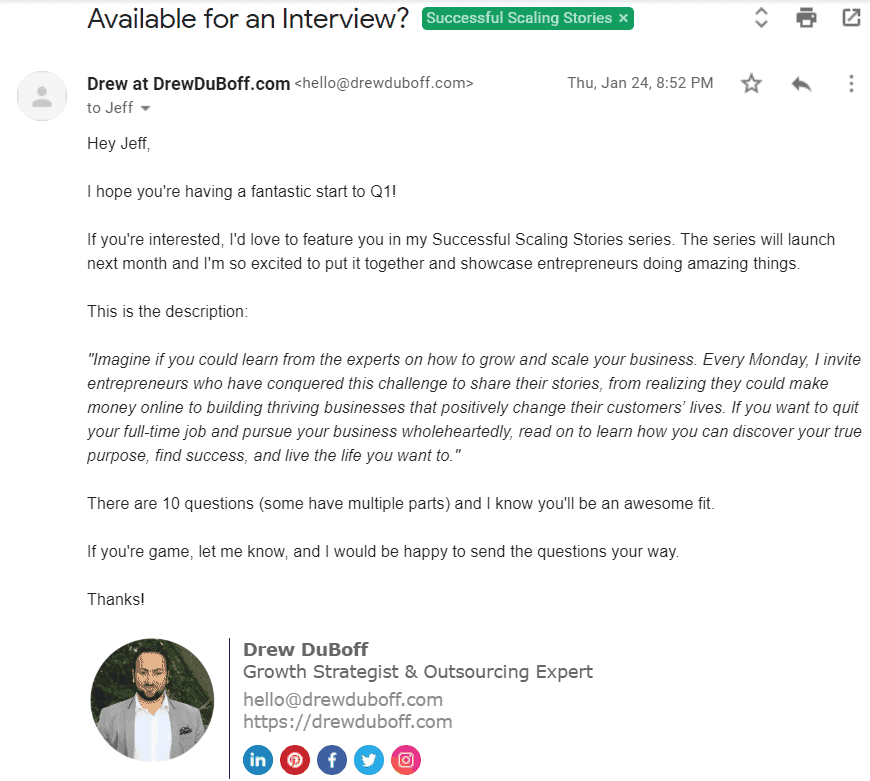How to Start an Interview Series With Leaders in Your Niche
Our readers always come first
The content on DollarSprout includes links to our advertising partners. When you read our content and click on one of our partners’ links, and then decide to complete an offer — whether it’s downloading an app, opening an account, or some other action — we may earn a commission from that advertiser, at no extra cost to you.
Our ultimate goal is to educate and inform, not lure you into signing up for certain offers. Compensation from our partners may impact what products we cover and where they appear on the site, but does not have any impact on the objectivity of our reviews or advice.
A well-crafted blog interview series is a great way to enhance your authority, boost your SEO, increase your blogging income, and more by interviewing top influencers in your niche. Here's how.

Some of the links on DollarSprout point to products or services from partners we trust. If you choose to make a purchase through one, we may earn a commission, which supports the ongoing maintenance and improvement of our site at no additional cost to you. Learn more.
This post was originally written by Drew DuBoff from DrewDuBoff.com.
Are you tired of seeing the same lead-generation tactics being blasted in your face by Facebook ads and big-name bloggers?
You know, the ones that say, “All you have to do is include a lead magnet in your post and email subscribers will just come your way in droves. The more relevant the opt-in, the better.”
Lead generation doesn’t have to follow the same process for every blogger, though.
In fact, it shouldn’t.
Enter the star-studded interview series.
You see, readers become less receptive to falling for the same tactics…
If people sign up for the “best” tips on a topic or the numerous make money online checklists, cheat sheets, printables, etc., then they’re going to be a lot less inclined to sign up for yours because they weren’t impressed by the ones before.
You need to be innovative when it comes to building your email list.
That’s why I recommend starting a blog interview series to kickstart your email marketing efforts.
What is a Blog Interview Series?
In the world of content marketing there are, generally speaking, 3 types of articles:
- How-To (How to Start a Blog)
- Listicle (17 Things to Include in Every Single Blog Post)
- Testimonial (How We Made $347,675 Blogging in Two Months)
An interview series takes the third type of article and expands it further into a question-and-answer-style testimonial.
By interviewing someone, you’re getting their opinion (or testimony) on a certain topic. Essentially, they become guest bloggers in the form of an interview.
A collection of those posts then becomes an interview series, generally focused around a certain topic.
For example, my blog interview series is called Scaling Success Stories, and I discuss topics like growing your business, outsourcing, and, of course, scaling an online business.
My interviewees are entrepreneurs who have successfully done those things.
The Benefits of Having an Interview Series on Your Blog
Since starting my interview series back in March, where I hosted Jeff Proctor as my first ever guest, I’ve realized there are more benefits than anyone (or I) could have predicted. Let’s talk about a few:
Content creation becomes easy
You don’t have to spend hours writing a post. After your initial outreach, you merely have to format your interviewees’ answers.
I’ve been able to pump out interviews in 1.5-2 hours, and that includes graphics creation and promotion.
Creating a template for your process is essential.
Expanded search visibility
If you’re like me and you target bloggers, you know they get searched in Google, especially if they have a large following.
But other people don’t necessarily target their names as keywords. I’ve gotten Google traffic and affiliate commissions from people searching for terms that Keywords Everywhere says have 0 monthly searches — all by leveraging the power of their branded and non-branded search terms (think terms like Jeff Proctor, DollarSprout, etc.).
Not to mention, you can also get backlinks, Google’s prized currency, from your interviews.
One of my more popular interviews with Sarah Titus just received a backlink from Arfa at She Means Blogging simply because she loved reading the interview.
Exposure to new audiences
There’s also this underlying reason — an ulterior motive, if you will — for why I love doing an interview series.
The exposure to new audiences is amazing.
As a beginner to intermediate (and even advanced) blogger, being advertised on a big-name blogger’s email list or social media profiles can result in some amazing subscriber increases.
And it has for me.
Every time I’ve gotten good billing in an email or social media post, I’ve seen a jump.
This screenshot is from when Alex and Lauren at Create and Go included me in an email following their interview going live.
The Anatomy of a Well-Structured Interview Series
SEO company Moz refers to their writers as “content architects.”
I think that’s a pretty cool name, but more importantly, it illustrates an effective point: you can’t just write content.
Rather, content has to be carefully constructed to address an entire topic in great detail.
If you go over to Moz’s blog, you’ll notice that they call their writers “content architects.” I think that’s a pretty cool name, but more importantly, it illustrates an effective point: you can’t just write content. Rather, content has to be carefully constructed to address an entire topic in great detail. @mozAn interview series follows the same guiding principles.
It has certain structural elements that are necessary for success:
- Choosing the right topic
- Writing the series description
- Crafting the interview questions
If you can nail these elements, pulling off a successful blog interview series becomes a breeze.
1. Choosing the right topic
Kind of like choosing a blog topic, you need to choose a topic for your interview series that is intriguing and compelling, but also has the potential for longevity.
It’s a tricky balance to strike.
My recommendation: find a topic that is underrepresented. By simply talking about something that other people in your space aren’t addressing, you’ll immediately become an authority on the topic.
When I started my series, there weren’t many authority figures teaching bloggers how to scale their online business. So that’s what I set out to do.
Because there isn’t one set formula to scale an online business, it means that I can get a diverse range of opinions on the topic.
That’s what allows for the longevity that I mentioned earlier.
2. Writing the series description
This is the fun part, I think. You get to live the life of a copywriter for a hot minute.
My series description went through many iterations before it arrived at what it is now:
“Imagine if you could learn from the experts on how to grow and scale your business. Every Monday, I invite entrepreneurs who have conquered this challenge to share their stories, from realizing they could make money online to building thriving businesses that positively change their customers’ lives. If you want to quit your full-time job and pursue your business wholeheartedly, read on to learn how you can discover your true purpose, find success, and live the life you want.”
Let’s break this down a little further.
Here are the core components of a well-written series description:
- Intriguing hook (Imagine if…)
- Publishing frequency (Every Monday…)
- Convey a transformation (from realizing…to building)
- Objective of the interview series (read on to learn how…)
Now that we’ve extrapolated the key elements, use this framework to create your own series description.
Share them in the comments below if you have questions and I’ll happily provide feedback.
3. Crafting the interview questions
For me, I keep the interview questions the same for each and every interview.
What this allows me to do is provide a clear picture of the topic from the perspective of different people.
For example, when I discuss outsourcing, I get various opinions.
Anything from “I’ve only outsourced a logo on Upwork/Fiverr,” to, “I’ve got a full team,” and everything in between.
Same sort of deal when I discuss paid ads.
To successfully obtain differing opinions, you need to craft open-ended questions that allow for wiggle room.
You shouldn’t really be leaning people toward a certain answer, although I’m guilty of that in one question, and I’ve been called out on it before.
You should aim to have a few background questions, but keep the bulk of them dedicated to the specific topic at hand.
The important thing is to keep the number of questions at or under 10.
If answered in detail, that will produce an interview of around 1,500-2,000 words, which is a good range for long-form content.
It’s also a length that makes participation for the guest easier. Ten questions isn’t that much to answer, when you think about it.
Securing the Right Experts for Your Interview Series
Truthfully, I think this is the hardest step of the entire process.
It’s kind of like applying to group boards on Pinterest. You apply to many and are accepted to few.
If you don’t know your guests at all before inviting them, count on your acceptance rate to be low. I’ve invited quite a few people to my interview series and I’ve only ever had 3 people reject my invitation.
I’ve broken my process into the following steps:
- Identify prospective interview guests
- Organize your outreach
- Email and follow up with your guests
4. Identify prospective interview guests
I like to look for guests in a few places:
- Facebook groups (ex. Ben and Jeff’s DollarSprout Ultimate Blogging Group)
- Blogging network (people I already know)
- Referrals (from my former guests)
- Previous interviewees (if they’ve done one before, they’re likely to do another)
- Conference attendee lists (ex. ConvertKit’s Craft & Commerce list)
I find that the best guests are micro-influencers, meaning that they have a smallish loyal following.
I think, at that level, they tend to produce the most honest and detailed answers. But that’s just my personal opinion. It could also be reflective of the niche that my interview series is in.
It’s worth mentioning, though, because a lot of people think they have to secure big-name influencers to have a successful series, and that just isn’t true.
Define successful by the impact you have on your readers, not by the caliber of guests on your series.
5. Organize your outreach
You need to have some sort of system to effectively organize your outreach.
You won’t even get to the “launch your series” phase if you can’t keep track of who’s agreed to participate and who’s already submitted answers.
Speaking of launching, I’d recommend getting at least 1 month of content lined up — with one interview every single day of the launch week.
(Ex. An interview was published every single day from 03/11 until 03/15 during my launch week).
Here’s a look into how I organize my spreadsheet.
I’ve created a version of this spreadsheet in Google Sheets for you to use.
6. Email and follow up with your guests
You can use the spreadsheet I linked in the last section to assist you with this process.
When pitching someone via email, you want to keep it short and concise, but clearly communicate the value proposition to the guest.
Here’s a look into my initial outreach email.
In the beginning, as a method of enticing the original guests, you can mention something to the effect of how you’ve secured Guests A, B, and C already.
If it’s people the prospect knows, it might push them over the edge to participate.
You can even save this as an email template in Gmail to expedite your email outreach.
A lot of people probably won’t respond at first. In that case, you can follow up with them after a few days. As a general rule of thumb, I recommend following up no more than 2 times. That makes a total of 3 emails, including the original outreach.
I’ve prepared a sample follow-up email for you to use that’s not intrusive to the prospect’s inbox.
Format, Publish, and Promote Your Interview Series
This part gets easier the more frequently you do it.
It’s broken down into these sections:
- Format and publish your interview
- Promote your latest interview to the world
7. Format and publish your interview
The first time you format your interview series, it will take some time.
I like to follow this format:
- Introduction to the series (with a specific templated graphic)
- Introduction to the guest
- Interview questions
- About the guest
- Affiliate promotion (if there is one)
- Conclusion
- Series-specific opt-in
Once you’ve done this format for the first interview, then just copy the post HTML from the text editor in WordPress and swap out the middle sections.
I like to refer to 2 posts as templates, one with the affiliate offer and one without it.
I also will use blockquotes and content boxes to help break up the content. Kristie Hill has a great post on how to use them in your posts.
For publishing the interviews, I try and use a set schedule so I can email my audience about the new interview.
I also tell my guests when the interview will be live, so it helps with promotion on their end.
8. Promote your latest interview to the world
For promoting the interview, I like to follow this process:
- Manually upload the pin to Pinterest
- Email my audience
- Send an email to the guest
- Share on social media
Emailing the guest is key.
It encourages them to share the interview with their audience, thus increasing your reach and opt-ins.
For that reason, I like to mention the following in my email to the participant:
- The link to the pin on Pinterest
- The link to the interview
- Copy that encourages them to give it any social and email love they can
At the end of the day, your email should show gratitude and appreciation.
That can also be a good time to ask for referrals for future guests.
A Well-Crafted Blog Interview Series is a Powerful Marketing Tool
If you want to pull off a great blog interview series, you now have the power and information to do so.
An interview series can be an excellent vehicle for monetizing your blog.
In this post, we discussed:
- What an interview series is
- The benefits of having an interview series on your blog
- The anatomy of a well-structured interview series
- Securing the right experts for your interview series
- Formatting, publishing, and promoting your interview series
And, don’t forget the exclusive freebies I created just for this post. There’s no opt-in required:











